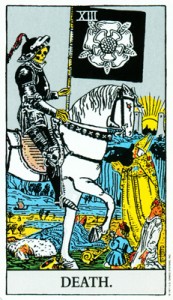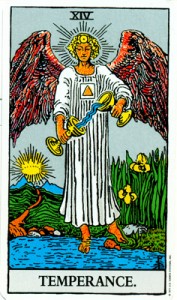The Intuition & Basic Ethics of the Tarot
Lesson 2: Intuitive Tarot Certification Course
All I can say is, WOW! So much useful and interesting information in this course. I learned about 2 very influential men, Carl Jung and Joseph Campbell.
Just a brief overview:
Carl Jung was a Swiss psychologist and founder of Analytical psychology, also called Jungian psychology. Originally he had no plans of studying psychology as it was frowned upon at the time. He later read that psychoses are personality diseases, which was of great interest to him. Jung had many childhood memories that left life long impressions, and realized this is what he was searching for. He was convinced as a boy he had 2 personalities; 1. A typical schoolboy living in the era of the time, 2. A dignified, authoritative and influential man from the past.
He was the first psychologist to say the human psyche is “by nature religion”. Jung was a practicing clinician, but most of his work involved the studies of Eastern and Western philosophies, such as alchemy, astrology, sociology, as well as art and literature. All of which are related to the human psyche found in dreams and the unconscious.
Jungian psychology (aka analytical psychology) is wholeness through the integration of unconscious forces and motivations underlying human behavior. It is the model of the unconscious mind as the source of healing and development in an individual. Jung saw the psyche as mind, but also admits the mystery of soul, and used as empirical evidence, the practice of an accumulative phenomenology around the significance of dreams, archetypes and mythology
Joseph Campbell was an American mythologist, writer and lecturer, known for his work in comparative mythology and comparative religion. Best known for his philosophy: “Follow your bliss.” After visiting The American Museum of Natural History in New York as a boy, he became versed in numerous aspects of Native American society, primarily in Native American mythology. He then became very passionate about myth and the study of and mapping of the cohesive threads in mythology that appeared to exist among even disparate human cultures.
Campbell was highly influenced by Sigmund Freud, but in particular on the work of Carl Jung. In his book The Mythic Image, Campbell quotes Jung’s statement about the Bardo Thodol, that it “belongs to that class of writings which not only are of interest to specialists in Mahayana Buddhism, but also, because of their deep humanity and still deeper insight into the secrets of the human psyche, make an especial appeal to the layman seeking to broaden his knowledge of life.
He had a big influence on pop culture. George Lucas credited Campbell’s influence. Lucas stated following the release of the first Star Wars film in 1977 that its story was shaped, by ideas described in The Hero with a Thousand Faces and. Campbell was further reinforced when reprints of Campbell’s book used the image of Mark Hamill as Luke Skywalker on the cover.Lucas discusses this influence the authorized biography of Joseph Campbell, A Fire in the Mind.
On to Archetypes, I was asked What is an archetype? Describe five examples of archetypes and their meanings which have not already been discussed in the lecture material (for instance a heart = love, red= stop, etc.)
An archetype is a symbol recognized universally that can trigger emotions or memories. It can take on different forms (e.g. a color, a sign, person, or place). It’s an idea or image from the unconscious. Also an original idea in which similar things are patterned.
Examples:
- Tiger: Very warm, loving. Independent minded. Pays scant regard for others feelings while pursuing fun and freedom.
- Monkey: Wily and cunning. Ignores regimented rules. Free spirit.
- Rooster: Brave and enthusiastic. Notoriously picky. Highly intelligent. Rarely has wool pulled over its eyes.
- Dog: Honest, loyal, sincere. Believes in justice for all. Fights for principles. Sometimes bad tempered, self-righteous.
- Dragon: Charismatic and colorful. Wants to be center of attention. Very arrogant.
I had to pick 2 cards from my deck and explain my perception of them:
Death was my first card. To me I find it an end and and beginning. It doesn’t necessarily mean psychical death, perhaps the end of an era. I can relate to this card in many ways, I had to let many things in my life end in order to have new and stronger beginnings. I believe a lot of people see this card and it scares them, to me it’s like saying “One door closes and another one opens.”
Second card is Temperance. Like the death card, I also see it as an end. There maybe disaster ahead, but these things too will pass. We must find self control and use everything in moderation, or it will lead to something unfortunate.
Tarot cards help you find deeper levels of emotion, through your connection with spirituality. There is something that lies deeper, the unconscious. Tarot reflects hidden aspects of your own life, It a helps you to communicate what you are actually seeing and mentally analyzing.
As far as The Tarot and destiny go, I believe destiny is what you make it. If you do a reading and it may not be positive, that can always be changed. I don’t believe anything is set in stone. I had the choice last year to lay down and die or get up and fight, I chose to fight. Our life is what we make of it. Sometimes we need help along the way and I see the Tarot as a great tool for that.
First and four most we need to realize while doing a reading, nothing is set in stone, as said before our destiny is what we make of it. The cards help show many possibilities in ones life, it just depends on how you chose to use the information you’ve received. People are coming to you for help, so be careful of the information you pass on. You never know one’s personal state of being. Never give anyone a scare, be sure to try and talk to the person and ask them questions. Make sure you have good communication.
Staying positive is important, you want a good connection not only with the person you are reading for, but also with your cards. I believe people, whether you know them or not can always feel negative vibes. That’s not going to make for a good reading and the cards may also reflect what you are feeling. I sound like a hippie.
I’ve been using the Witches tarot and The Rider Deck, I’ve found that I really like The Rider Deck. I just purchased the Dali and The Legacy of the Divine Tarot, I think the cards are beautiful. Does anyone else have these decks, and what do you think?
Feel free to post your thoughts, opinions and comments.
Thanks for stopping by! Have a great day!
Lisa
Tags: Rider-Waite Tarot, Tarot, The Witches Tarot






